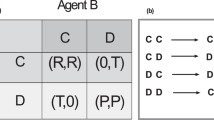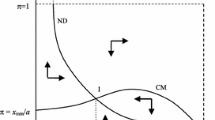Abstract
The iterative two-person Prisoners’ Dilemma game has been generalised to theN-person case. The evolution of cooperation is explored by matching the Tit For Tat (TFT) strategy (Axelrod and Hamilton 1981) against the selfish strategy. Extension of TFT toN-person situations yields a graded set of strategies from the softest TFT, which continues cooperation even if only one of the opponents reciprocates it, to the hardest, which would do so only when all the remaining opponents cooperate.
The hardest TFT can go to fixation against the selfish strategy provided it crosses a threshold frequencypc. All the other TFT are invadable by the selfish (D) or the pure defector strategy, while none can invadeD. Yet, provided a thresholdpc is crossed, they can coexist stably withD. AsN, the size of the group increases, the threshold pc also increases, indicating that the evolution of cooperation is more difficult for larger groups. Under certain conditions, only the soft TFT can coexist stably against the selfish strategyD, while the harder ones cannot. An interesting possibility of a complete takeover of the selfish population by successive invasions by harder and harder TFT strategies is also presented.
Similar content being viewed by others
References
Aoki K 1983 A quantitative genetic model for reciprocal altruism: A condition for kin or group selection to prevail.Proc. Natl. Acad. Sci. USA 80: 4065–4068
Aoki K 1984 Quantitative genetic model of two policy games between relatives.J. Theor. Biol. 109: 111–126
Axelrod R 1984The evolution of cooperation (New York: Basic Books)
Axelrod R and Hamilton W D 1981 The evolution of cooperation.Science 211: 1390–1396
Brown J L, Sanderson M J and Michod R E 1982 Evolution of social behaviour by reciprocation.J. Theor. Biol. 99: 319–339
Charnov E L 1982The theory of sex allocation (New Jersey: Princeton Univ. Press)
Gadgil S, Nanjundiah V and Gadgil M 1980 On evolutionarily stable compositions of populations of interacting genotypes.J. Theor. Biol. 84: 737–760
Mines W G S 1980 An evolutionarily stable strategy model for randomly mating diploid populations.J. Theor. Biol. 87: 507–513
Lombardo M P 1985 Mutual restraint in Tree Swallows: A test of the TIT for TAT Model of Reciprocity.Science 227: 1363–1365
Maynard Smith J 1974 The theory of games and the evolution of animal conflicts.J. Theor. Biol. 47: 209–221
Maynard Smith J 1982Evolution and the theory of games (New York: Cambridge Univ. Press)
Peck J R and Feldman M W 1986 The evolution of helping behaviour in large randomly mixed populations.Am. Nat. 127: 209–221
Riechert S E and Hammerstein P 1983 Game theory in the ecological context.Annu. Rev. Ecol. Syst. 14: 377–409
Taylor M 1975Anarchy and cooperation (London and New York: Wiley)
Trivers R L 1971 The evolution of reciprocal altruism.Q. Rev. Biol. 46: 377–409
Wilson D S 1975 A theory of group selection.Proc. Natl. Acad. Sci. USA 72: 143–146
Wilson D S 1980The natural selection of populations and communities (Mcnlo Park, CA: Benjamin-Cummings)
Author information
Authors and Affiliations
Rights and permissions
About this article
Cite this article
Joshi, N.V. Evolution of cooperation by reciprocation within structured demes. J. Genet. 66, 69–84 (1987). https://doi.org/10.1007/BF02934456
Received:
Issue Date:
DOI: https://doi.org/10.1007/BF02934456




